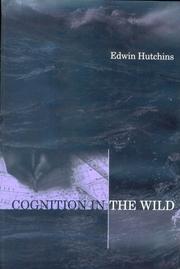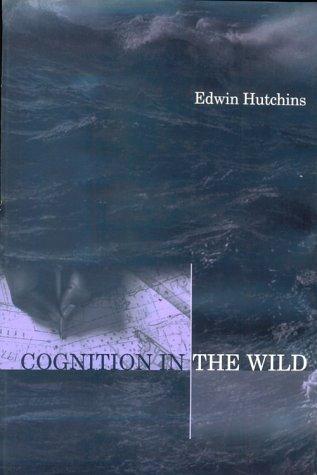Check nearby libraries
Buy this book

Edwin Hutchins combines his background as an anthropologist and an open-ocean racing sailor and navigator in this account of how anthropological methods can be combined with cognitive theory to produce a new reading of cognitive science. His theoretical insights are grounded in an extended analysis of ship navigation - its computational basis, its historical roots, its social organization, and the details of its implementation in actual practice aboard large ships.
The result is an unusual interdisciplinary approach to cognition in culturally constituted activities outside the laboratory - "in the wild.".
Hutchins examines a set of phenomena that have fallen between the established disciplines of psychology and anthropology, bringing to light a new set of relationships between culture and cognition. The standard view is that culture affects the cognition of individuals. Hutchins argues instead that cultural activity systems have cognitive properties of their own that differ from the cognitive properties of the individuals who participate in them.
Each action for bringing a large naval vessel into port, for example, is informed by culture; thus the navigation team can be seen as a cognitive and computational system.
Introducing life in the Navy and work on the bridge, Hutchins makes a clear distinction between the cognitive properties of an individual and the cognitive properties of a system. In striking contrast to the usual laboratory tasks of research in cognitive science, he adopts David Marr's paradigm and applies the principal metaphor of cognitive science - cognition as computation - to the navigation task.
After comparing modern Western navigation with the method practiced in Micronesia, Hutchins explores the computational and cognitive properties of systems that involve multiple individuals. He then turns to an analysis of learning or change in the organization of cognitive systems at several scales.
- Hutchins's conclusion illustrates the costs of ignoring the cultural nature of cognition and points to ways in which contemporary cognitive science can be transformed by new meanings and interpretations.
Check nearby libraries
Buy this book

Previews available in: English
Subjects
Cognition, Case studies, Cognition and culture, Naval Psychology, Navigation, Psychological aspects, Psychological aspects of Navigation, Psychology, Naval, Social aspects, Social aspects of Cognition, Distributed cognition, Culture, Military Psychology, Aspect social, Cas, Études de, Cognition et culture, Aspect psychologique, Études de cas, Cognition distribuée, Psychologie militaire, Culture note, SCIENCE, Cognitive Science, PSYCHOLOGY, Cognitive Psychology, Kognition, Kognitive Psychologie, Kultur, Kulturelles System, Marine, Psychologie, Schifffahrt, Schiffsnavigation, Seeschifffahrt, Verkehrspsychologie, Social SciencesShowing 3 featured editions. View all 3 editions?
| Edition | Availability |
|---|---|
|
1
Cognition in the Wild (Bradford Books)
September 1, 1996, The MIT Press
Paperback
in English
0262581469 9780262581462
|
zzzz
Libraries near you:
WorldCat
|
| 2 |
aaaa
Libraries near you:
WorldCat
|
| 3 |
zzzz
Libraries near you:
WorldCat
|
Book Details
Edition Notes
Includes bibliographical references (p. [375]-378) and index.
Classifications
The Physical Object
ID Numbers
Community Reviews (0)
Feedback?| July 15, 2024 | Edited by MARC Bot | import existing book |
| November 15, 2022 | Edited by ImportBot | import existing book |
| February 21, 2022 | Edited by Drini | Edited without comment. |
| February 21, 2022 | Edited by Drini | Merge works |
| December 10, 2009 | Created by WorkBot | add works page |










